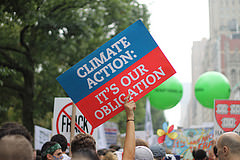
About two and a half weeks ago, the United Nations summit occurred in New York City, and along with it came worldwide demonstrations—the people-marching-in-the-streets-yelling-and-carrying-signs kind—intending to pressure UN representatives into carbon emissions reform that would help mitigate the effects of global warming.
Backed by a host of prominent activists, politicians and celebrities, including Al Gore and Leonardo DiCaprio, the People’s Climate March attracted throngs of revisionists who called out China, the U.S. and other nations whose carbon emissions levels are dangerously high.
The protests came after the March report released by the UN’s Council on Climate Change that was the first to speak in terms of adaptation to global warming instead of prevention, the term previous reports had used. However, the issue is by no means new: the march’s founder, a prominent environmentalist named Bill McKibben, wrote his first book on climate change in 1989. Thus, these events did not occur solely because of one, or even a few, facts or figures.
“I don’t think the protests had anything to do with any major specific event that recently happened. I think it’s probably more…a gathering of people who decided after a point that they were fed up with what they perceived to be inaction on the part of [legislators and governments],” said Mr. Dave Lapish, an English teacher here at LHS.
Mr. Lapish, aside from teaching literature and composition, currently runs the high school’s earth-caring club: LEAF, or Libertyville Environmental Action Force. He has headed the organization for 11 years.
And although Mr. Lapish’s organization is mostly concerned with picking up trash and disposing of recyclable materials properly, Mr. Lapish himself is still uneasy about the state of the environment as a whole. When asked about the prospect of hydraulic fracturing—a controversial process of extracting natural gas from the earth also known as “fracking”—in Illinois, he said, “I always worry about what we’re doing that we can’t see.”
McKibben shares this anxiety: an article he wrote last month for Mother Jones was subtitled, “Fracking May Be Worse Than Burning Coal.” And of course, as he expressed in his article, he hates burning coal.
The complaints about the actions of governments and massive multinational corporations, though, may just be beside the point because other than events like these protests, it may be difficult to involve oneself so actively. As such, organizations like LEAF exist to help connect everyday folks to their environment.
According to Mr. Lapish, however, preserving the earth may be even easier than joining a club. He stressed that people should know which materials are recyclable in which ways and what materials are not recyclable at all. He said that tossing non-recyclables into recycling bins could cause whole loads of recycling to be thrown out because the pile can’t be sorted.
Ironically enough, the protest groups have been criticized in the past two weeks for leaving copious amounts of trash behind in the streets where they congregated.











